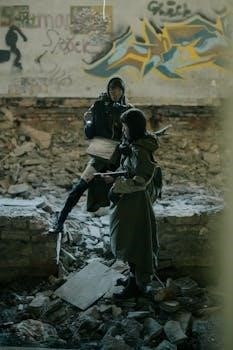
Ruined by Lynn Nottage⁚ An In-Depth Analysis
Lynn Nottage’s Ruined defies simple labels, exploring themes of war, resilience, and unconventional love. Set against the backdrop of the Democratic Republic of Congo, the play delves into the lives of women impacted by conflict, offering a profound examination of their experiences.
Overview of Ruined
Lynn Nottage’s Pulitzer Prize-winning play, Ruined, presents a powerful and unflinching portrayal of the lives of women in the war-torn Democratic Republic of Congo. The play centers around Mama Nadi, a shrewd businesswoman who runs a bar and brothel, providing a haven for women displaced and damaged by the ongoing conflict. Ruined delves into the complex realities of war, exploring the themes of rape, resilience, and the struggle for survival in the face of unimaginable brutality.
Nottage’s work goes beyond simple categorization, weaving together elements of an unconventional love story with a stark depiction of the irreparable damage inflicted by war. The play serves as a global political message, highlighting the use of rape as a weapon of war and its devastating consequences on individuals and communities. Through its compelling characters and unflinching narrative, Ruined challenges audiences to confront the harsh realities of conflict and the enduring strength of the human spirit.
The play is not only a story of suffering but also one of hope and the possibility of finding humanity amidst chaos. The characters grapple with difficult choices and strive to maintain their dignity in a world that has been ripped apart by violence.
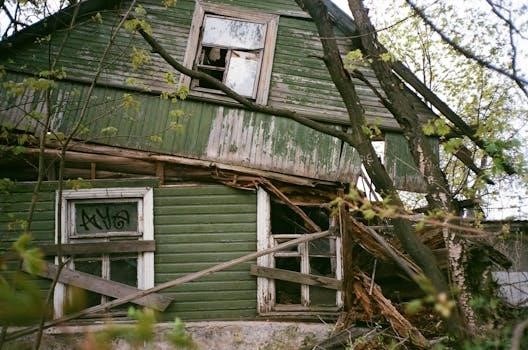
Lynn Nottage’s Inspiration and Research
Lynn Nottage’s inspiration for Ruined stemmed from her desire to give voice to the untold stories of Congolese women affected by the brutal conflict in the Democratic Republic of Congo. In 2004, Nottage traveled to East Africa to collect narratives from women who had experienced immense trauma, including rape, torture, and displacement. She sought to understand their experiences and shed light on the devastating consequences of war on their lives.
Nottage’s research involved extensive interviews and conversations with Congolese women, allowing her to gain a deep understanding of their resilience, struggles, and hopes. She immersed herself in their stories, carefully documenting their experiences and perspectives. This commitment to authenticity and accuracy is evident in the play’s dialogue, characters, and overall portrayal of the Congolese conflict.
By listening to the voices of these women, Nottage crafted a powerful and moving play that humanizes the victims of war and challenges audiences to confront the realities of sexual violence as a weapon of war. Ruined is a testament to Nottage’s dedication to telling stories that are often ignored or marginalized, bringing attention to the experiences of women caught in the crossfire of conflict.
Setting and Context⁚ Democratic Republic of Congo
Ruined is set in a small mining town in the Democratic Republic of Congo (DRC), a nation ravaged by years of civil war and political instability. The play immerses audiences in a world where government soldiers and rebel forces clash, creating a climate of fear and violence. The DRC’s rich natural resources, particularly minerals like coltan, have fueled the conflict, attracting various armed groups vying for control.
The play highlights the devastating impact of the war on the Congolese people, especially women, who are often targeted for sexual violence. The setting serves as a backdrop for exploring themes of survival, resilience, and the struggle to maintain humanity in the face of unimaginable horrors. The characters navigate a landscape scarred by conflict, where trust is scarce, and danger lurks around every corner.
Nottage’s portrayal of the DRC reflects the realities of a nation struggling with poverty, corruption, and the long-lasting effects of war. The setting is not merely a backdrop but an integral part of the narrative, shaping the characters’ lives and influencing their choices. Through its vivid depiction of the DRC, Ruined sheds light on the human cost of conflict and the challenges faced by those living in war-torn regions.
Mama Nadi⁚ A Central Figure
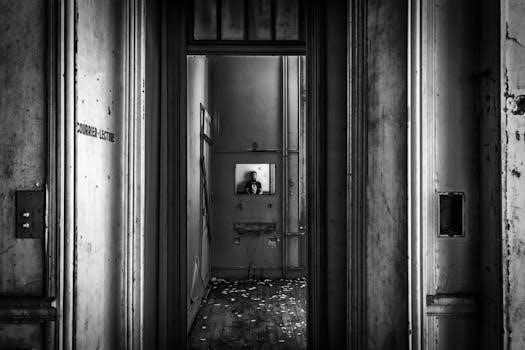
Mama Nadi, the shrewd and resilient proprietor of a bar and brothel in the war-torn Democratic Republic of Congo, stands as a central figure in Ruined. She is a complex character, a businesswoman striving to survive and maintain her establishment amidst the chaos of civil war. Mama Nadi provides a haven, albeit a precarious one, for women displaced and traumatized by the conflict.
Her bar serves as a neutral ground where government soldiers and rebel forces alike can find temporary respite, highlighting her pragmatic approach to survival. Mama Nadi’s primary concern is the well-being of her business, and she makes tough decisions to ensure its continued operation. She embodies a survival instinct, demonstrating resourcefulness and strength in a brutal environment.
Despite her tough exterior, Mama Nadi displays moments of compassion and empathy, particularly towards the women under her care. She offers them a degree of protection and a means of livelihood, although her motives are not always altruistic. Mama Nadi represents the complexities of morality in a war zone, where survival often demands difficult compromises. Her character is pivotal to understanding the play’s themes of resilience, exploitation, and the search for humanity amidst conflict.
Themes⁚ War, Rape, and Resilience
Ruined powerfully explores the devastating themes of war, rape, and resilience within the context of the Democratic Republic of Congo. The play unflinchingly portrays the brutal realities of civil conflict, particularly its impact on women’s bodies and lives. Rape is depicted as a weapon of war, used to inflict not only physical harm but also deep psychological trauma and social stigma.
The women in Ruined, including Salima and Sophie, are victims of sexual violence, and their experiences highlight the long-lasting consequences of such trauma. The play confronts the issue of family disownment and the challenges faced by survivors in rebuilding their lives. Despite the horrors they endure, the characters in Ruined demonstrate remarkable resilience.
They find strength in community, solidarity, and their determination to survive. The play celebrates the human spirit’s capacity to endure even the most unimaginable suffering. Through music, dance, and storytelling, the characters express their pain, hope, and unwavering commitment to reclaiming their lives. Ruined serves as a testament to the resilience of women in the face of war and a call for justice and healing in conflict-affected regions.
Character Analysis⁚ Salima and Sophie
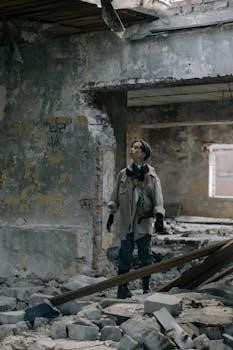
Salima and Sophie are central figures in Ruined, representing the devastating impact of war on women in the Democratic Republic of Congo. Salima, a wife and mother, is brutally raped and cast out by her family, embodying the societal stigma faced by survivors of sexual violence. Her journey highlights the challenges of reclaiming her identity and finding acceptance after such trauma. Salima’s monologue reveals her pain and the monumental space between her gasps and sighs.
Sophie, on the other hand, is “ruined” in a different way, suffering internal injuries from rape that render her unable to bear children. Despite this, she displays remarkable resilience and a desire for independence. Sophie’s character explores the theme of physical and emotional healing, as well as the search for self-worth in a society that often devalues women who have been victimized.
Both Salima and Sophie challenge societal expectations and demonstrate the strength and complexity of women in the face of adversity. Their stories offer a glimpse into the true narratives of Congolese women, giving a voice to their experiences of trauma and resilience. Nottage crafts their characters with empathy, showcasing their flaws, beauty, selfishness, and generosity.
Unconventional Love Story
Amidst the brutal realities of war, Ruined presents an unconventional love story between Mama Nadi and Christian. Their relationship is complex, shaped by the harsh environment and their individual experiences. Christian, a traveling salesman, offers Mama Nadi a connection to the outside world and a sense of hope. However, Mama Nadi, hardened by her past, struggles to trust and open herself to love.
Their love story is unconventional because it blossoms in a brothel, a place of exploitation and survival. Mama Nadi’s establishment is a refuge for women “ruined” by war, and their relationship is intertwined with the lives of these women. Christian’s genuine affection for Mama Nadi challenges her cynicism and forces her to confront her own vulnerabilities.
The play explores the possibility of love and connection in the face of trauma and devastation. It questions whether love can truly conquer all, or if the scars of war are too deep to heal. Ultimately, the unconventional love story between Mama Nadi and Christian adds a layer of hope and humanity to the play, reminding us that even in the darkest of times, the human heart can still yearn for connection.
Music and Dance in Ruined
Music and dance play a vital role in Ruined, serving as powerful tools for expression, resistance, and healing. Lynn Nottage incorporates Congolese musical traditions into the play, creating an authentic and vibrant soundscape that reflects the culture and spirit of the characters. The music and dance provide a means for the women to connect with their heritage, express their pain, and find moments of joy amidst the suffering.
The songs in Ruined often carry symbolic weight, conveying themes of loss, hope, and resilience. The women use their voices to reclaim their identities and share their stories. Dance becomes a form of catharsis, allowing them to release pent-up emotions and find solace in movement. In Mama Nadi’s bar, music and dance create a temporary escape from the harsh realities of the war outside.
Nottage masterfully integrates music and dance into the narrative, enhancing the emotional impact of the play and deepening our understanding of the characters’ experiences. The vibrant sounds and rhythms of Congolese culture offer a counterpoint to the violence and devastation of war, highlighting the enduring strength and beauty of the human spirit. The music and dance in Ruined are not merely decorative elements; they are integral to the play’s meaning and impact.
Ruined as a Modern “Mother Courage”
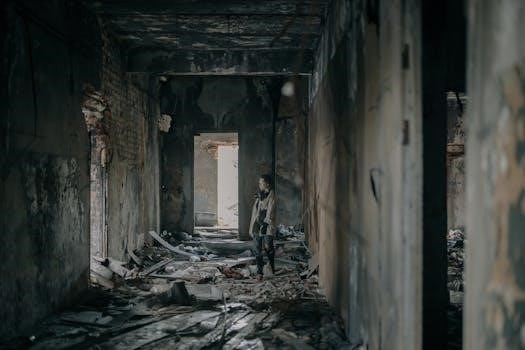
Lynn Nottage’s Ruined is often compared to Bertolt Brecht’s Mother Courage and Her Children, drawing parallels between Mama Nadi and Mother Courage as resilient businesswomen navigating war-torn landscapes. Both characters operate within morally ambiguous contexts, striving to survive and profit amidst conflict. However, Ruined offers a distinct perspective, focusing specifically on the experiences of women in the Democratic Republic of Congo and the devastating impact of sexual violence.
While Mother Courage’s primary motivation is economic survival, Mama Nadi’s character is more complex. She seeks to protect the women under her care, providing them with a safe haven and a means of livelihood. However, her business also relies on the exploitation of these women, creating a moral dilemma. Nottage’s play delves deeper into the emotional and psychological toll of war on individuals, particularly the trauma of rape and its lasting consequences.
Ruined updates the themes of Mother Courage for a modern audience, addressing contemporary issues of gender-based violence and the global impact of conflict. Nottage’s play is a powerful and poignant exploration of resilience, survival, and the enduring strength of women in the face of unimaginable adversity, making it a vital and relevant work for our time.
Critical Reception and Awards
Ruined garnered widespread critical acclaim, praised for its powerful storytelling, compelling characters, and unflinching portrayal of the devastating impact of war on women. Lynn Nottage’s meticulous research and her ability to give voice to the experiences of Congolese women resonated deeply with audiences and critics alike.
The play’s premiere at the Goodman Theatre in Chicago was met with enthusiastic reviews, with many critics highlighting Nottage’s skillful blending of realism and theatricality. The New York production further solidified the play’s reputation as a significant work of contemporary theater.
Ruined received numerous awards and accolades, including the prestigious 2009 Pulitzer Prize for Drama, cementing Nottage’s place as a leading playwright of her generation. The play also won the Obie Award for Playwriting, the Lucille Lortel Award for Outstanding Play, and the Drama Desk Award for Outstanding Play, among others. These honors recognized the play’s artistic merit and its important contribution to the conversation about war, gender, and human rights. The critical success and numerous awards demonstrate the profound impact Ruined had on the theatrical landscape and its enduring relevance as a work of social and artistic significance.
The Global Political Message
Ruined delivers a potent global political message, focusing on the devastating use of rape as a weapon of war, particularly in the Democratic Republic of Congo. Lynn Nottage uses the play to expose the brutal realities faced by women in conflict zones, highlighting their resilience amidst unimaginable violence and trauma. The play underscores the urgent need to address systemic issues that perpetuate such atrocities.
Nottage’s work transcends geographical boundaries, speaking to the universal experiences of women affected by war and conflict around the world. By giving voice to marginalized stories, Ruined challenges audiences to confront uncomfortable truths and to consider their role in promoting peace and justice. The play calls for international accountability and emphasizes the importance of supporting survivors of sexual violence.
The political message is woven into the narrative through the characters’ personal journeys, demonstrating the far-reaching consequences of war on individuals and communities. Ruined serves as a catalyst for dialogue and action, urging audiences to advocate for policies that protect women and prevent future atrocities. Ultimately, the play strives to raise awareness and inspire change on a global scale.
Dramaturgical Exploration
A dramaturgical exploration of Lynn Nottage’s Ruined reveals the depth and complexity of the play’s construction. The play is rooted in the true stories of Congolese women who experienced trauma such as rape, torture, and family disownment, offering a voice to their experiences and a platform for their narratives. Nottage’s commitment to representing both the sacred and profane, the transcendent and lethal, is central to the play’s impact.
The play’s setting, a small mining town in the Democratic Republic of the Congo, is crucial to understanding the characters’ struggles. Mama Nadi’s bar becomes a microcosm of the larger conflict, where government soldiers and rebel forces interact, and where women are often exploited. The use of music and dance adds another layer to the dramaturgical landscape, providing moments of beauty and resilience amidst the violence.
Exploring the play’s structure, themes, and character development reveals Nottage’s skillful craftsmanship. The unconventional love story between Mama Nadi and Christian adds complexity, while the character arcs of Salima and Sophie highlight the devastating impact of war on women’s bodies and minds. The dramaturgical elements of Ruined work together to create a powerful and thought-provoking theatrical experience.
Impact and Legacy of Ruined
Ruined has left an undeniable mark on the landscape of American theatre, sparking conversations about war, gender-based violence, and the resilience of the human spirit. The play’s impact is far-reaching, prompting discussions about the role of art in addressing social and political issues. Its critical acclaim, including the Pulitzer Prize for Drama, solidified its place as a significant work of contemporary theatre.
The play’s legacy extends beyond the stage, influencing educational institutions and community organizations to engage in dialogues about the themes explored in the play. Ruined has become a tool for raising awareness about the ongoing conflict in the Democratic Republic of Congo and the challenges faced by women in war-torn regions. Its unflinching portrayal of the realities of war has resonated with audiences worldwide, prompting empathy and action.
The play’s exploration of complex characters and morally ambiguous situations has also contributed to its lasting impact. The characters in Ruined are not simply victims or perpetrators, but individuals grappling with difficult choices in the face of extraordinary circumstances. This nuanced portrayal has allowed audiences to connect with the play on a deeper level, fostering a greater understanding of the human cost of conflict.